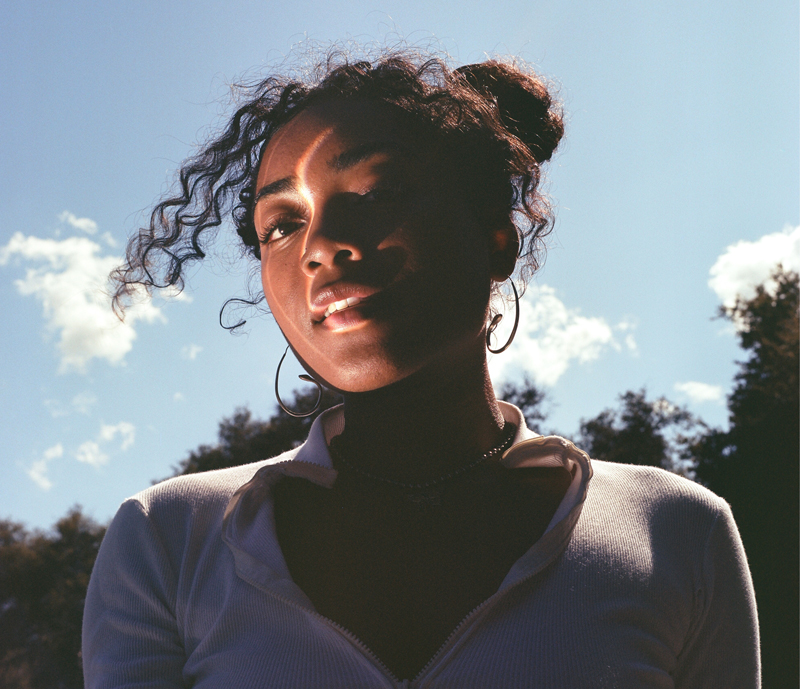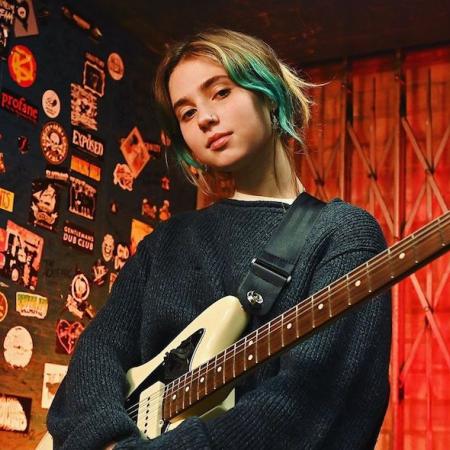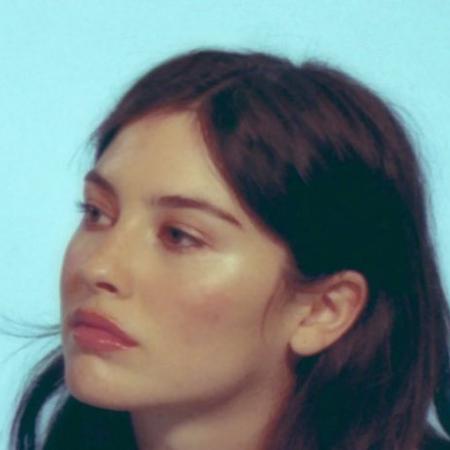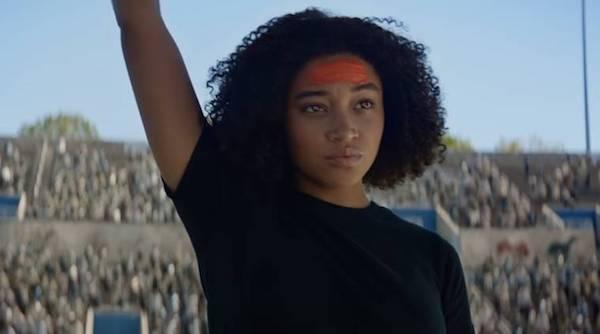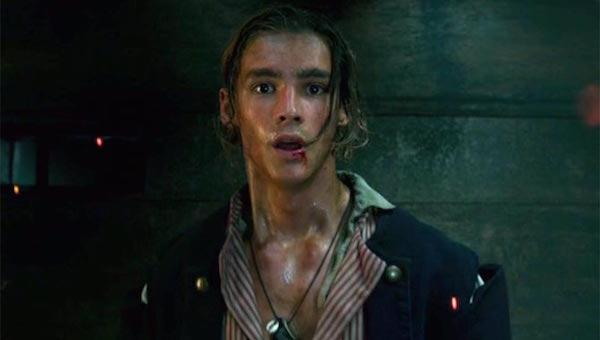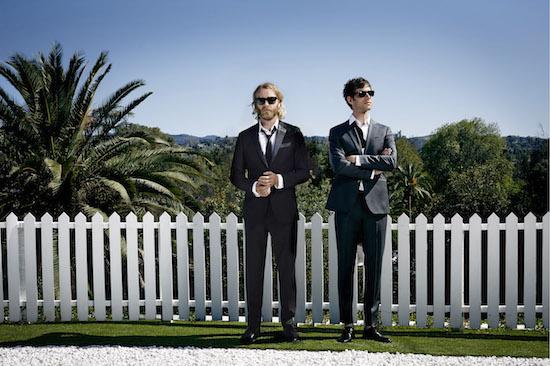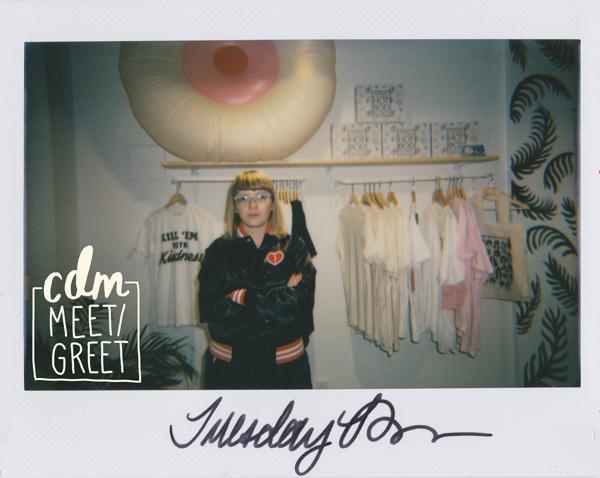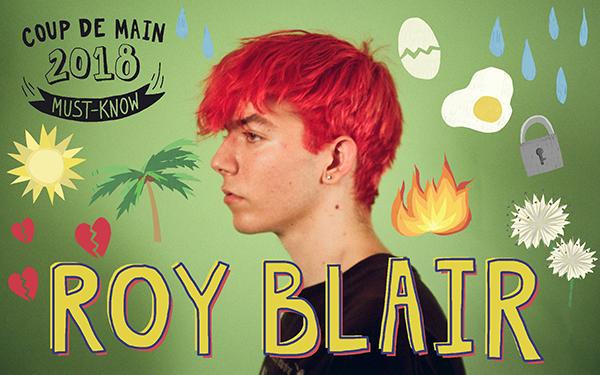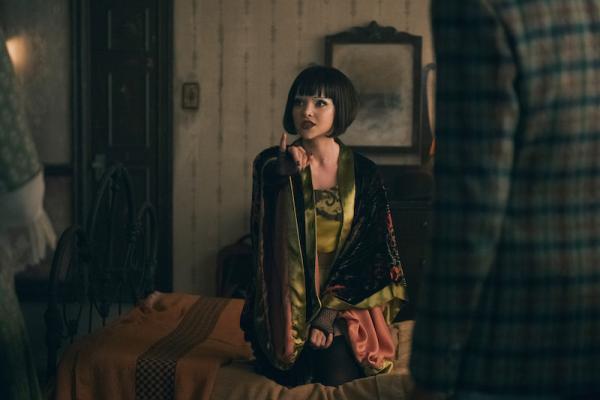"Right now at this moment, I'm feeling pretty blue, like a light blue," UMI shares with me over the phone, a few days out from the release of her 'Introspection' EP - released last Sunday in time with the new moon in Cancer.
On the new EP (which follows her 'Love Language' EP from last year), UMI tackles love, the idea of self, familial relationships, and more through her reflective and thoughtful lens, which serves as a "reflection of [her] journey inward." Releasing the EP with an accompanying short film, UMI's creative vision is entirely fulfilled, sharing that: “The film is an extension of the music, creating a world for viewers to live in. The story is an apt visual metaphor for how interconnected life and our individual experiences really are." Created alongside her longtime collaborator Jocelyn Woods and produced with Issa Rae’s production company Raedio, the short-film builds on the EP's themes and gives them life through new characters and experiences.
We spoke with UMI ahead of the release of 'Introspection' to discuss the importance of growth, honesty and truth, and more...
...embracing change is so important to growth, embracing ourselves is so important to growth, and meeting growth with an open mindset because there's always a bit of growing pain. I feel like I grew a lot in creating this project and a lot of that growth came from having really low points, and being uncomfortable sometimes, but it's because I was in such a new situation and looking at myself in new ways, and not letting that stop me from taking the next step is important to growth.
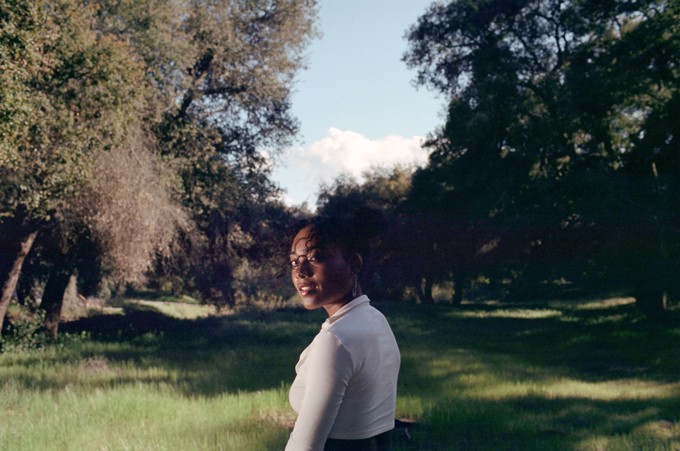
CDM: In the opening song and title track of your 'Introspection' EP you sing, "Allow the divine to alter your courses." How much of life do you think is predetermined?
UMI: That's a great question. I think that purpose is almost predetermined. By purpose, I mean, what makes you happy, almost like what you're meant to be doing in this lifetime is predetermined. I believe in past lives, so I think it's a reflection of the work in your past lives and what you and your ancestors were meant to manifest and bring to the world. I feel like my purpose is to create music and to heal through my music and my art. My little sister works in dietetics and nutrition; I think her purpose here is to heal people through her knowledge of nutrition. So I think everyone has a purpose. That's an intuitive knowing and I think that's almost predetermined, but I think that we also have the power to shift and shape the energy of our reality - like whether you're going to chase your purpose or not, and I think that when you chase your purpose it is where your highest life or your most happy, fun, abundant life lies because it's what you're meant to doing, and so you have the power to manifest those things - manifest abundance, manifest wealth, manifest joy and love into your life. So I think all those things and the divine within you, have the power to control.
CDM: Was it on purpose when you sing about "pretty girls" in 'Introspection' as a reference to 'Pretty Girl hi!"?
UMI: I didn't write those to be connected because I didn't even have a project envisioned when I was writing 'Introspection', but then when I heard those two lyrics I was like, 'Oh, these songs are meant to be on the project together.' It was almost a sign I created for myself to put those two songs on the project. When I wrote 'Introspection', I was kind of talking about myself because the line says, "Pretty girl, pity hurts / Know you walk across a fine line and / Your pretty curls hide your pretty pearls," and the first line is all about not having so much self-pity and holding so much negativity within myself and that there's this fine line I'm walking between almost within myself: 'Am I being too negative? Or am I being realistic? Or am I overthinking?' It was just this introspective moment, and then talking about my pretty curls, and how I used to always hide behind my hair a lot. That would hide my pretty pearls and I feel like my pretty pearls meant the beauty within me - so the pretty girl is me in that song, and then in 'Pretty Girl hi!' it's more of a person outside of me.
CDM: I really like the lines in 'Open Up' when you sing: "I shouldn't run from the bad times / I should just work on my bad side.” Do you think that facing bad times head-on is the best way to handle them?
UMI: Yeah 100%. I feel like you always intrinsically know something you should confront and you should work on and I call that shadow work - working on those darker aspects of yourself, whether that's depression, or anxiety, or anger, all those emotions and realising that more joy and abundance is on the other side and embracing and loving that part of myself. Facing those parts of yourself is so important, to evolve and grow as a person.
CDM: I love the short film to accompany the EP, it’s so cool! I like your spoken word part when you begin: “I’ve been thinking - do you ever think what it's like to see the world through other people's eyes? What are other people going through?” That idea of knowing you’re the main character in your own story, but a minor character in so many other people’s stories can be bizarre to come to terms with, but do you think it’s an important realisation in life?
UMI: Thank you again, for just picking up on the subtleties of the film and the music. I think it's so important. It's almost like realising you are the creator of your reality, but you also have the power to impact other people's realities and other people are also living the realities outside of yourself. So it's a balance of being present in your own life, but realising the interconnectedness of all of our realities, that was what I was starting to realise as I was exploring that thought within my mind and just realising that, "Wow, I may never know what someone else is necessarily going through," and that if I'm doing the inner work to heal myself and to radiate love and positivity, then whatever someone else is going through, I can still impact them without having to know the whole story. I could be a background character and still shed light as if I was the main character in someone else's life.
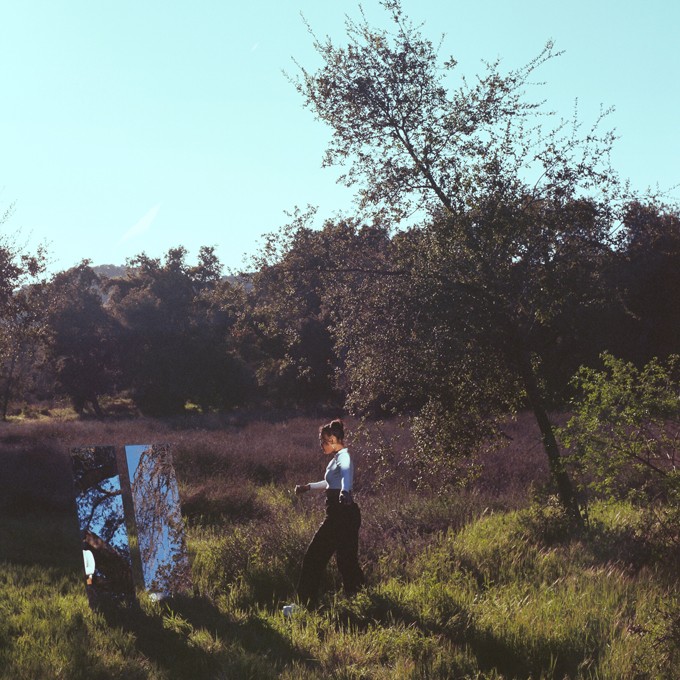
CDM: How did you conceptualise and put together the storyline of the short film? Was it before you were working on the songs or did it kind of come at the same time?
UMI: I started working on the songs first and the songs are like a reflection of my personal growth; my introspective journey over the past two years. The past year and a half has been a very formative part of my life, I've started to figure myself out and understand, 'What is my personality? What is me?' So that's reflected in the music. I remember I was actually thinking of making an album at first and I just kept feeling like, 'It's not the time yet. I feel like I have something different that's meant to be channelled through me.' So I was just playing all the music for my friend Jocelyn, my soul sister, we co-wrote the script together, and we directed the project together. She just asked me, "What song stand out to you the most?" And then from there, we created the tracklist. And then after we created the tracklist we were like, "So what does each song mean?" We took a trip to Malibu and spent 24 hours just brainstorming, 'Where was I when I wrote the songs? What is the deeper meaning of the songs?', and then actually created a story outside of myself. We call it 'portaling', when we creatively flow for a period of time, so over 24 hours, we just talked and the whole film just kind of came out of us.
CDM: The other line that I love in the short-film is: "I guess we give more to the people we love, than to ourselves." Why do you think it's the human condition that so often we feel we should have that imbalance in love?
UMI: I was just talking to a friend about this, I feel like it all comes back to love and a desire to be loved. That's so intrinsic within, just with all species on this planet. But I think growing up because of society and the world, we've been almost programmed to think that we are more loved when the people around us are happier, that we can appease the people around us, and we can give to the people around us. I think without knowing, unconsciously, we continue to live our lives with that mentality - that if I just give more to this person and they love me more, and I feel like I was definitely at that place, and I'm still working through that thought in my mind. Realising that how someone else feels or how someone else is, isn't a reflection of how much they love me. Or it's a lot of things out of my control. And when I started to see things from a body perspective and realise that love isn't conditional and I don't have to give to receive it, it was a very profound moment. So that's kind of why we wanted to put that in there and I feel like it's a universal experience for people.
CDM: You sing about honesty and truth on a few EP songs ('Open Up' and 'Bet'). Do you think that being honest with each other is one of the most important things in a relationship, be it friendship or romantic?
UMI: Yeah! One thing I've been learning especially through creating this project and working so closely with Jocelyn is that you can't expect people to fully understand everything that you're thinking or everything that's on your mind, everything that you're feeling, and frustration, and feeling misunderstood, and unloved, honestly comes from you not explaining yourself enough, and this is what I learned for myself. I just have to speak up and not expect someone to read my mind and be honest about how I feel about something and not expect someone to know my honesty. Knowing that has been so profound and helped me to have more mature, deeper relationships with the people around me. Not being afraid to be honest, and if someone's hurt because of my honesty, that's not my problem. That's a harsh way to say it but that's outside of my control, all you can do is to speak your truth, and surround yourself with people who can receive truth and speak truth as well.
CDM: You sound really powerful on 'Bet' when you sing, “You on some clown shit and I ain't about it, don't ever doubt it," and it is a very relatable line. I love it! Did it feel empowering to write that song?
UMI: Yes! I'm so happy. I wasn't even going to release that song because I remember thinking like, 'This is so not me, I don't know if I want a song that's coming from that place in my being which is more of a red colour.' But I played it for Jocelyn and she was like, "You have to put this on the project! This is a vibe. People are going to love this." It helps to express all parts of me. So I'm really happy that you feel empowered too.
CDM: What was running through your mind when you wrote the opening line, "Love doesn't grow in the middle of the garden," in 'Broken Bottles'?
UMI: That was like a flow lyric. I remember when I heard the beat and that line instantly came to my mind. 'Broken Bottles' as a whole is about my relationship with my dad and alcoholism and substance use and coming to terms with someone that I feel like I'm supposed to love, but I was like, "I don't know how I feel about this person," and that song is about how there seems to be all this love around me but there isn't love growing with my dad. I just feel like that relationship is broken. Then after writing that song and being honest about where I was with my dad, I started to open up to him more. Now my dad and I are in a great place and I genuinely love, love, love my dad. I feel like when I wrote that song I couldn't say that. So that line was a reflection of that place I was in, where I was like, I want to love him, but there's no love growing right now because of all this stuff I'm holding against him about things that were in the past, and so writing that song helped me to accept the past and move forward and develop a loving relationship with him.
CDM: Does that tie in with in 'Where I Wander' when you sing, "You should treat your daughter like she matters / With some kind of loving?" Is that the same story?
UMI: Yes! When I was writing this project, there was so much pent-up feeling and I'm glad I released it, and I feel like people are gonna relate. I think there's a lot of parental trauma that a lot of people are still dealing with and working with. I think it's just good to address it because it's universal.
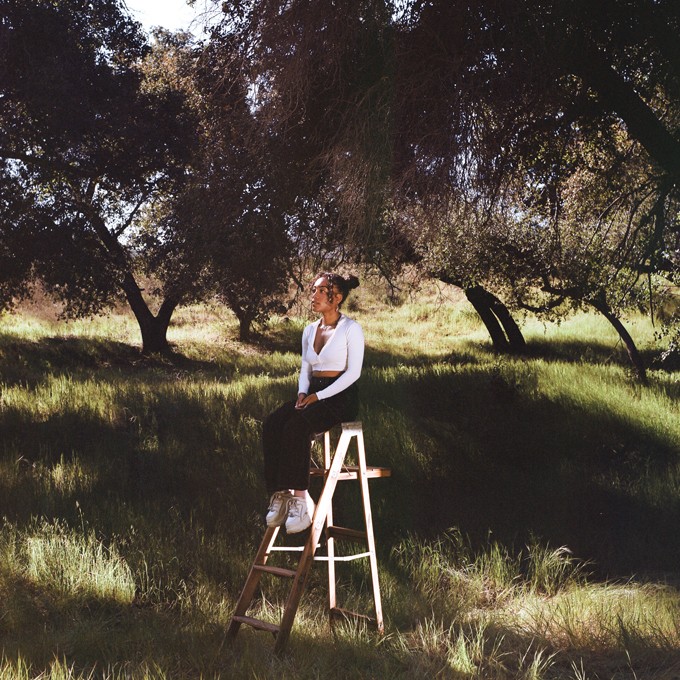
CDM: You’ve described the EP as “a reflection of my inner journey over the past year, embodying my growth." Why do you think that growth and acknowledgement of your growth is such an important part of the human experience?
UMI: That's a great question. I think growth is all around us - when you look at nature, when you look at trees, when you look at plants, things are constantly growing and evolving and that almost seems like the purpose of the tree is simply to grow and evolve. And so I think we are reflections of nature and so that similar desire and purpose to grow is within all of us. And embracing change is so important to growth, embracing ourselves is so important to growth, and meeting growth with an open mindset because there's always a bit of growing pain. I feel like I grew a lot in creating this project and a lot of that growth came from having really low points, and being uncomfortable sometimes, but it's because I was in such a new situation and looking at myself in new ways, and not letting that stop me from taking the next step is important to growth.
CDM: With the growing pains idea in mind, I feel like the world is going through growing pains right now as the Black Lives Matter movement is reignited across the world following the horrific murders of innocent Black people by police in a number of U.S. states. How are you feeling about the movement? Do you feel hopeful about change and progress?
UMI: I'm so hopeful, I'm so excited. I've been embracing every day with a sense of optimism. This is a beautiful time for Black Lives Matter to be having its almost rebirth because all anyone can do now is listen. There isn't anything distracting us from the reality of the world and so I'm just excited about all the change. Change is going to be happening for people of colour but I feel like for all people in general as we reshape the way society looks. As you said, there's so much growing pain because we've gotten so comfortable with the way things are - the way policy is, the way police are, the concept of police. But we're being challenged to look at society and go, "This isn't working." We've been pretending it was working because we're all so busy and living almost separate lives and now we're realising radical change has to happen. I'm very, very positive and hopeful that it's going to happen, and especially looking at how much the youth care, it makes me really hopeful. But I think it's important to stay optimistic and remember it's a process. It's not gonna happen overnight, but that's the beauty of it because we get time to adapt to this new world and this new reality.
CDM: I saw you’ve been reading ‘The Artist Of Self-Creation' book ("The struggle for most of us has been in letting go of the images and expressions that do not fit, or the ones we've outgrown, and learning to trust out innate ability to recognise image, and bring forth the emerging real self"). Have you read any other important books that have helped you explore the idea of self?
UMI: My favourite book is called 'A New Earth' by Eckhart Tolle. That's been so profound, I come back to that book a lot. I think it's such an introspective book and it's so fitting for the times right now. So I highly recommend it to anyone who is looking for a book to read. It's about re-examining our perception of self and our attachment to labels and how when we label ourselves we hold ourselves back from experiencing our essence and about how thinking too much holds us back from experiencing the moment and being present. It talks about the labels of the world and how we can we re-approach the world and see the world in new ways. I'm also currently reading this book called 'Ishmael' [by Daniel Quinn]. I remember I had it a year ago and I just kept being like, 'I'm not ready to read it yet,' and I started reading it when the lockdown began and it's so reflective of the time we're in, it talks about evolution and society and schools of society and how we can reform society to be better and more sustainable. I'm still reading ‘The Artist Of Self-Creation', so I can't give a full review on that book. 'The Alchemist' is another great book that I read on tour.
UMI's 'Introspection' EP is out now - click here to listen and watch the short-film below:


